Written by: Dr. Shahida Jaffrey Jamali - Posted on: August 23, 2013 |  Comments | 中国 (Chinese)
Comments | 中国 (Chinese)
Google Translation: اُردو | 中文
The jeep of the Pakistan army engineers’ road construction crew jeep struggles up the vertical incline of a remote mountain, billowing clouds of black smoke, and stops near a remote hamlet in the Northern Areas of Pakistan. A villager rushes forward carrying a bucket of water and places it in front of the jeep, saying, "This animal must be very thirsty after the treacherous climb!"
Villagers saw the "steel animal,” a jeep, for the first time in their lives. It belonged to the Pakistan Army Corp of Engineers who were building the engineering marvel, the Karakoram Highway. Completed in 1978, it is the highest Highway in the world, crossing over into China at Khunjerab at an altitude of 16,000 feet.
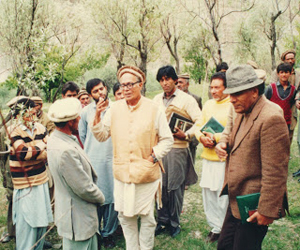 |
| Akhter Hameed Khan and Shoaib Sultan Khan, the most distinguished personilties in the history of RSPs |
This is the region where Shoaib Sultan Khan - SSK - began his pioneering rural development work, and began the innovative Aga Khan Rural Support Programme - the AKRSP.
We were in Manila, when I read an article published in Newsweek International, one full page, on the last page of the magazine, titled A Man Named Khan. Sri Lankan journalist Tarzie Vittachi had published a profile of Shoaib Sultan Khan, recognizing his accomplishments in Mahaweli, Sri Lanka, making “community participation the key to rural economic development.”
Shoaib Sultan Khan began the AKRSP in Gilgit in 1982 and shared its First Annual Report (and subsequent ones), air mailing them to Manila to my husband Tarik Jaffrey (his CSP student), who was at the Asian Development Bank. After reading the reports, Tarik passed them on to me. I studied the thick, typed cyclostyled reports as I would a text book, using a pencil and underlining parts of the text. I had never been to Gilgit, but saw it through the reports that influenced me and I – when so destined – went to Gilgit to work and live amongst the most beautiful people and exotic land, the Roof of the World!
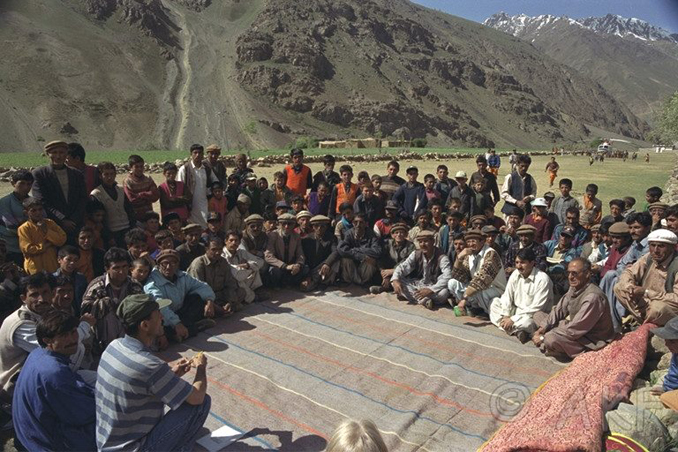 |
| Conducting a dialogue with local villagers |
When his flight from Islamabad to Gilgit was canceled, Shoaib Sultan Khan borrowed a jeep from another Aga Khan project and set out on the 600 km road trip on the Karakorum Highway. He arrived the next day, he recalls, "after spending the coldest night of my life in a rest house which had no bedding." In Gilgit, the new program had "no premises, no staff, no logistical support," he writes.
“On arrival at Gilgit, I had rented two rooms in the PTDC Chinar Inn motel at Rs. 3,000 per month. It was later converted into an apartment and the rent was fixed in perpetuity on the same terms and conditions as offered to Justice Cornelius in Flettis Hotel in Lahore. Even after my departure from Gilgit in 1994, AKRSP has maintained the apartment for me. This was the beginning of the Aga Khan Rural Support Programme (AKRSP) and forging of partnerships over the next twelve years with a million people in one of the most inhospitable and harshest terrains anywhere in the world.”
As a young civil service officer (CSP 1955 batch), Shoaib Sultan learned from Dr. Akhter Hameed Khan, the rural development pioneer, who developed an agriculture development scheme in 1959 called the Comilla Model. Sultan brought with him a simple but time-tested message from the days of German cooperative pioneer Friedrich Wilhelm Raiffeisen in nineteenth century Europe, one subsequently followed by Japan, Taiwan, Comilla (Bangladesh) and South Korea.
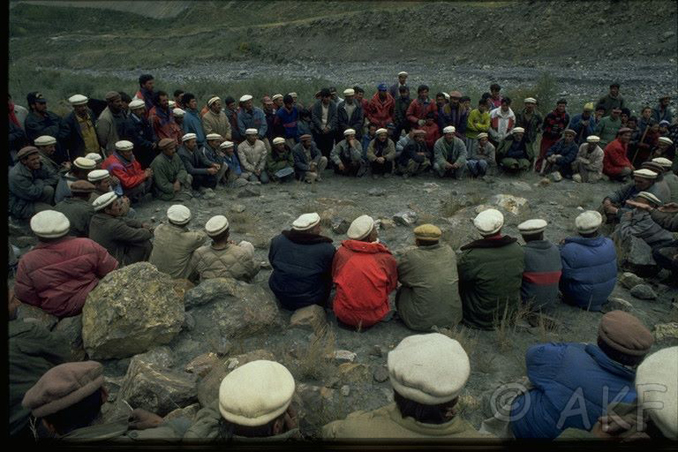 |
| Dialogue with villagers during a field visit |
“The villagers must choose a project collectively and it must benefit everyone; they must form an organization to plan, build, and maintain the project; they must meet regularly with everyone present; andthey must make systematic contributions to a common fund so that there would be savings and collateral to help meet future needs.”
Having lived life of a diplomat’s wife for 16 years, in Brussels and Manila, and with the sudden passing of my husband Tarik Jaffrey on October 30, 1989, I called Shoaib Sultan Khan, who was then General Manager of the Aga Khan Rural Support Programme, and told him, “I have a PhD and I will work for you in Gilgit.” He was keen that I come to work in Gilgit, but was afraid that I would not be able to survive the very harsh and difficult life of the remote area.
I accompanied Shoaib Sultan on the Aga Khan Foundation helicopter to Gilgit, flown by pilots Col. Ijaz and Saif, with the Chief Commissioner Northern Areas, Mr. Afzal Kahut and his wife, as co passengers. That was my first ever flight on a helicopter; it flew over freshly snow covered mountains and trees along the 2 hour flight. On arrival we landed on the small runway in Gilgit just before dark. Only two Fokker flights operated daily in the morning at that time; other than that the airport runway was used by senior administration officers as a walking track!
Mr. Kahut, a junior colleague of my late husband, invited me to stay at the Commissioner House. Shoaib Sultan said “If she wishes to work for the AKRSP, she will stay at the Women’s Hostel,” so my bag was carried to the structure that was the AKRSP Women’s Hostel, located on the banks of the Gilgit river, and a room was given to me. At that time, the city received electric power for three hours, three times a week from 6 pm to 9 pm. I was given a kerosene lantern and a kerosene room heater that emitted smelly fumes, never experienced before, and that made my Italian cashmere woolen clothes smell of kerosene!
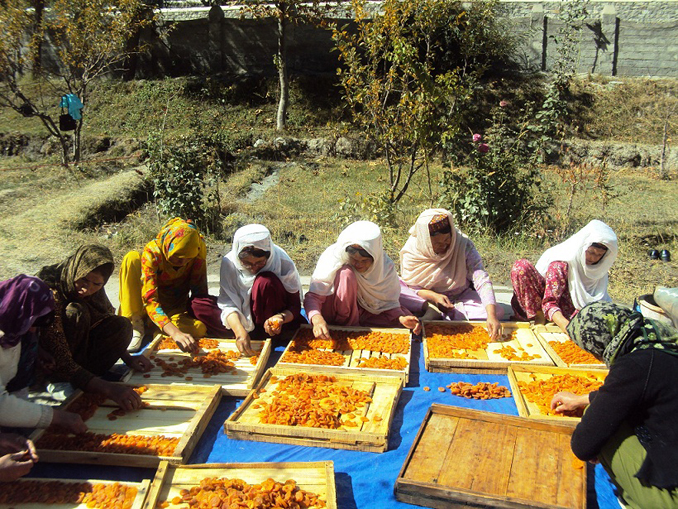 |
| Local women drying apricots in the sun |
Morning brought sun and a clear blue sky. The River Gilgit was aquamarine blue and most beautiful. We had three days of field visits by helicopter. The views were spectacular; Paradise could not have been be more beautiful.
The young Monitoring Officer accompanying us, who was documenting every word said and all activities performed, explained “The valley we are flying into leads to Gupis/Ghizar and Chitral, and the other to Hunza, Khunjerab and China.”
We flew along the Gilgit river valley and landed on a small piece of flat land atop a mountain, where a helipad had been prepared by the villagers. The helicopter created a storm, the wind generated by its propellers sending everything - including their chickens - flying in different directions.
It was freezing. Shoaib Sultan was the first to alight and shook hands with the villagers that had gathered, embracing each and every one of them, and then all sat on a flimsy mat that covered the freezing ground. Shoaib Sultan spoke to the villagers in Urdu. Translations were done where required. A tiny battery powered tape recorder recorded every word said, and the young Monitoring Officer took notes.
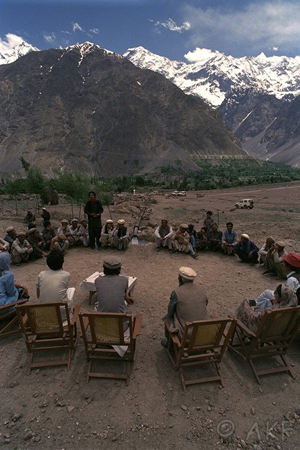 |
| Community representatives being taken into confidence about AKRSP initiatives |
He enquired about the progress of ongoing development activities. Sultan knew each and every one of the villagers and addressed them by their names. We made three stops that day.
The next day’s sortie took us to the other valley, Hunza, where again three stops and three Dialogues were conducted, all while sitting on freezing ground covered only by a thin mat.
At one mountain stop, after the Dialogue, the villagers had laid out an elaborate high tea, complete with roasted desi chicken and french fries – I had never seen such long potato fries, each a foot long, fried from huge, locally grown, organic potatoes. Shoaib Sultan reprimanded the villagers for “wasting” their money on tea and food when his instructions were not to do so. He left and we followed him; I can still visualize the very long french fries after almost 23 years!
Sultan’s instructions to both villagers and staff were: food will not be prepared for visiting AKRSP staff. That tradition continues today, 30 years later; staff carries their own food on field visits in every RSP.
When Afzal Kahut invited me for dinner one evening, I shared with him my experiences of the three days of field visits. I asked him, “Shoaib Sultan Khan does all the work in the area; what do you do as the Commissioner?” He replied, “I do revenue work, law and order, etc. etc. I took the AKF Helicopter for a field visit, where villagers had gathered, and when I stepped out, they asked ‘Where is the GM? (as Shoaib Sultan was known).’ I felt slighted; they were looking for the GM and were not happy to see me, the Commissioner of the Northern Areas!”
I joined the AKRSP in March 1990.
The AKRSP office premises were and still are found in a beautiful cluster of rented tin-roofed British style bungalows on high ground overlooking the Gilgit river, near the airport and the Local Jail, on Babar Road. Its address is: AKRSP, Babar Road Gilgit. Simple!
Shoaib Sultan was the first in his small office room every morning, arriving at 7.30 am, and the last to go. He took a break from work for 1 hour for his walk along the Gilgit river. At around 8.30 a.m. he took a stroll through the offices, leaving his calling card on the tables of tardy staff, specially the younger ones from Down Country, with a hand written message at the back: “Office begins at 8 am.” That left all terrified; next morning would see them all present at the office on time, even if they had jumped straight out of bed! The toilets saw several tooth brushes and shaving kits; maybe some extra changes of clothes too were tucked away in Almirah shelves!
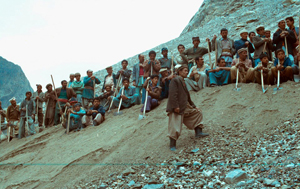 |
| Locals volunteering for the development projects carried out by AKRSP |
He was extremely accommodating and understanding of staff, especially all of us from Down Country. Life in Gilgit was harsh and we were living away from our families. PIA Fokker planes operated only in clear weather, which was 50% of the year. On waking up, the first thing one did was to look at the sky. “If there are clouds over Chilas, flights will not come.” Chilas lies behind the mountains to the south of Gilgit valley. PIA Fokkers brought life to Gilgit, people and newspapers, and when it landed, the city knew – life had come!
There was no TV, what PTV showed were videotaped programmes from Down Country, relayed from the TV Booster located in Danyore, across the river. News could not be broadcast, as by the time the tape arrived, the daily news had become old and redundant. Newspapers arrived by road, and if the Karakoram Highway was blocked, they arrived several days late. I remember, we went through the Iraq/Iran war in blissful ignorance, enjoying the peace and tranquility of beautiful Gilgit.
We were allowed generous vacation and our holidays were never counted. Local staff took Project jeeps and drove in every direction for the weekend – we stayed in Gilgit.
When the young ones at the hostel felt lonely and bored, their destination was my home, the rented stone house of Ali Shah, the driver of the Administrator/ Commissioner; it lay across from the IG Police’s House. I fed them exotic foods. I remember that my influential, powerful and kind neighbor, the Inspector General Police, sent to me one day a huge carcass of a mountain goat - the Ibex - that had been sent to him from Skardu by a Superintendent Police. Saying, “Baji I do not have a freezer, keep it, cook it and share some with me.”
So my young Hostel friends enjoyed many a times, Ibex kofta (meatballs) pulao rice and meat curry. When I narrated this story to Shoaib Sultan on a drive back from Hunza, two years ago, he remarked, “Had I known I would have had all of you charged!” But it came from the kind IGP NA!!
That is not the case anymore. AKRSP, in collaboration with the IUCN and WWF, has trained villagers in protecting wildlife that gives them rich dividends, sharing 75% of the proceeds of trophy hunting with the Wildlife Department.
A Deputy Commissioner Gilgit paid a fine of Rs. 25,000 for trophy hunting of a Markhor!
Tourists can now watch Ibex, Morkhor and sometimes even the Snow Leopard from the roadside.
He travelled all over the Northern Areas by jeep, crossed glaciers and rivers on foot, riding on horseback where roads did not exist, and taking the back seat of the motorcycle of a Social Organize, often with a dog chasing behind!
Being a PhD, a golf champion, an artist, President of Asian Development Bank Women’s Club, and having travelled the world, I thought I had tremendous knowledge and experience: but I felt completely ignorant arriving in Gilgit and with the AKRSP. I had to unlearn what I had learnt and learning had to begin afresh. The AKRSP lessons: a WO was a Woman Organisation, VO a Village Organisation and SOU Social Organisation Unit. An SO was a Social Organiser and a WSO a Woman Social Organiser. VO Banking and how it was done; single cropping and double cropping zones; silage and how and why it was prepared; what was a Kulh – the water channel carved out and across the mountain to catch snow to melt into water; and later how the Hydel Power stations were constructed and managed; all this was part of my learning.
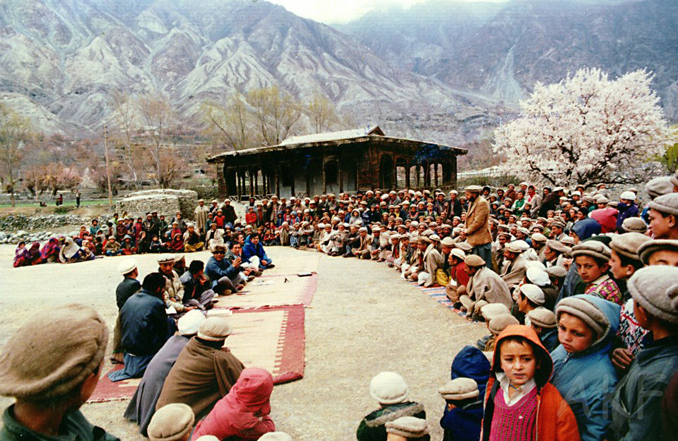 |
| Shoaib Sultan Khan holding First Dialogue with community members in Sherquilla, Gilgit in 1982 |
My training began by accompanying Mehbooba, a WSO to a WO Poultry Specialist training in Nagar. We arrived on time in a small village right under the Rakaposhi mountain, with fruit trees in full blossoms – it was March. About 30 women had gathered inside, young and old, exceedingly beautiful women, some with natural red hair. Live chickens were brought in; the women were to be trained as Poultry Specialists: their work would include vaccinating chickens against common diseases. AKRSP poultry trainers brought along vaccines and, using visuals, gave them instructions, and live demonstrations. Thousands of such Poultry Specialists were thus created, who vaccinated poultry and earned a small fee. It was my training too, and the lesson then learnt, I still remember vividly - I forgot most of the learning done in class for my PhD!
Roads were nonexistent. Travel time was measured in how long it took to reach a certain destination and not what the distance was. Travel was on small Daitshu Rocky four wheel drive jeeps:
Today, with wide metal highways, the drive is much faster and most pleasurable!
With the successful creation of the AKRSP as a development model, hundreds of government functionaries and development experts flocked to Gilgit to learn from the lessons of the institution, so much so that a Visitor’s Center was added in 1991.
Every Civil Service group arrived for training: the DMG, the NIPA, officers attending the Administrative Staff College, the National Defence College, the Army Staff College, interns, visiting groups and development practitioners.
The First Harvest was a documentary made to tell the AKRSP story, and used as a training tool. It was played thousands of times and viewed by visitors and trainees, and thousands of its copies were taken by learners.
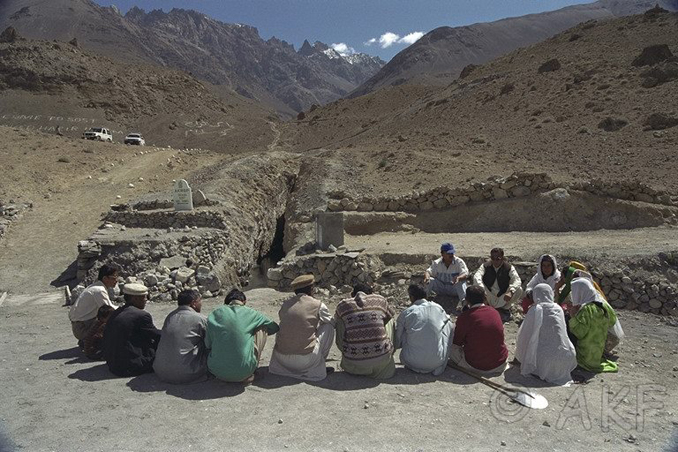 |
| Project |
Dr. Rashid Bajwa was the Assistant Commissioner of Hunza and later of Gilgit. He gave up his prestigious Civil Service position as a DMG officer, and began work as an Intern Social Organiser at the National Rural Support Programme, Islamabad. Later, he became the CEO of the largest RSP and took the NRSP to great heights.
Shandana Khan, fresh from Cambridge University after an Honors’ degree, arrived in Gilgit in 1990 and began work as an Intern receiving Rs. 4000 per month. Today she is the CEO of RSPN, and was named in Newsweek magazine’s “100 Women Who Shake Pakistan.”
Masud-ul-Mulk was with AKRSP Monitoring Unit; he headed the AKRSP Chitral and is currently the CEO of SRSP.
Khalil Tetley, the monitoring man, researcher, and documenter/writer; today he is the COO at the RSPN
Muzaffar, the very bright young intern from Shimshal, who travelled on foot to and from his village “crossing 11 glacier melt streams/nallahs and 6 glaciers, attended Oxford University, and is today the RGM at AKRSP.
Women Social Organisers have held Ministerial positions in the Northern Areas/Gilgit Baltistan government, and most are holding important positions in development organizations around the country.
HRD - Skill trainings were not only for the community members. All local staff was sent abroad for higher education
Today the face of the Northern Areas- now granted provincial status and the new name of Gilgit Baltistan, has changed. Every child attends school; most attend prestigious universities in Pakistan and abroad; millions of trees have been planted; California apples and French cherries are marketed country wide; dried apricots are picked up by a London buyer from the farm gate at Gilgit, further cleaned and sold in Whole Foods organic stores in the US and, so are Hunza mulberries, relished as a delicacy.
Millions in community’s savings have resulted in the setting up of First Micro Finance Bank, and NRSP Micro Finance Bank.
“Shoaib Sultan is a recipient of numerous awards including the distinguished UNDP Global 500 Award in 1989, the Sitara-i-Imtiaz in 1990, the Ramon Magsaysay Award in 1992, the WWF Conservation Medal in 1994, the Man of the Year Rotary International (Pakistan) Gold Medal in 2005, and the Sitara-e-Eisaar and Hilal-i-Imtiaz by the President of Pakistan in 2006. In 2009, he was elected as Senior Ashoka Fellow. He has penned numerous research papers and books and is considered as an authority in the field of rural development. In 2009, he was nominated for the Nobel Peace Prize for "Unleashing the power and potential of the poor."
30 years on, thousands of “little” Shoaib Sultan Khans have been created and are working all over the country, India and South Asia and in other parts of the world.
A network of 12 Rural Support Programmes has been created - the Rural Support Programmes Network - RSPN is the largest Development Network of Pakistan with an outreach to over 32 million rural Pakistanis. And the AKRSP development model has been replicated all over Pakistan, South Asia, as well as around the world.